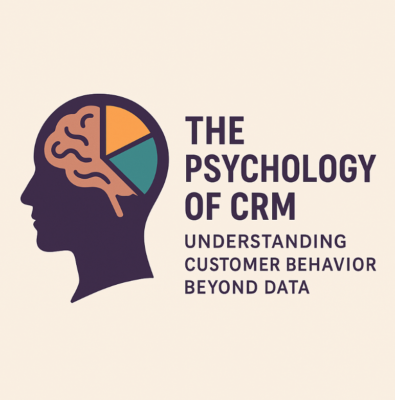
Customer Relationship Management (CRM) has long been associated with data collection, automation, and predictive analytics. However, while data-driven insights are crucial, they often fail to capture the full spectrum of customer behavior. Understanding the psychology behind customer interactions provides a deeper, more human-centric approach to CRM. By combining psychological principles with CRM strategies, businesses can foster stronger emotional connections, enhance loyalty, and improve overall customer satisfaction.
The Role of Emotions in Customer Decisions
Customers do not make decisions based solely on logic and numbers. Emotions play a significant role in purchasing behavior, brand loyalty, and customer satisfaction. A CRM system that incorporates emotional intelligence can help businesses understand not just what customers do, but why they do it. By analyzing emotional triggers such as trust, fear, excitement, or frustration, businesses can tailor their communications and interactions to resonate more deeply with their audience.
Personalization Through Behavioral Psychology
Traditional CRM systems rely on past transactions, demographics, and engagement metrics to personalize interactions. However, incorporating behavioral psychology takes personalization to the next level. For example, the principle of reciprocity suggests that customers are more likely to engage with brands that offer them something valuable first, such as exclusive content, discounts, or helpful insights. Similarly, the concept of social proof—where people are influenced by the actions of others—can be leveraged by showcasing testimonials, reviews, and user-generated content in CRM-driven marketing campaigns.
The Impact of Cognitive Biases on CRM Strategies
Cognitive biases are mental shortcuts that affect how customers perceive information and make decisions. Understanding these biases can help businesses craft more effective CRM strategies. Some key biases to consider include:
- Anchoring Bias: Customers rely heavily on the first piece of information they receive. Offering a premium option first can make other choices seem like better deals.
- Loss Aversion: People fear losing something more than they value gaining something. Limited-time offers and exclusive deals capitalize on this bias.
- Choice Overload: Too many options can overwhelm customers. CRM systems can streamline choices by offering personalized recommendations rather than extensive product catalogs.
Building Long-Term Relationships Through Trust and Engagement
Trust is one of the most critical psychological factors in customer relationships. A CRM system that prioritizes transparency, consistency, and authenticity helps foster trust over time. Companies can achieve this by ensuring clear communication, honoring commitments, and responding proactively to customer concerns. Additionally, engagement should feel natural rather than forced. CRM-driven interactions should align with customer preferences, whether through personalized emails, social media engagement, or loyalty programs.
The Future of Psychology-Driven CRM
As AI and machine learning continue to advance, CRM systems will become even better at analyzing human behavior and emotions. Sentiment analysis, voice recognition, and AI-powered chatbots are just the beginning of a shift towards more psychologically aware customer interactions. Businesses that embrace this fusion of psychology and technology will be able to create deeper, more meaningful connections with their customers.
Conclusion
CRM is no longer just about data—it is about people. Understanding the psychological factors that drive customer behavior allows businesses to craft more effective, personalized, and emotionally resonant experiences. By integrating psychology into CRM strategies, companies can move beyond transactions and build genuine, lasting relationships with their customers.